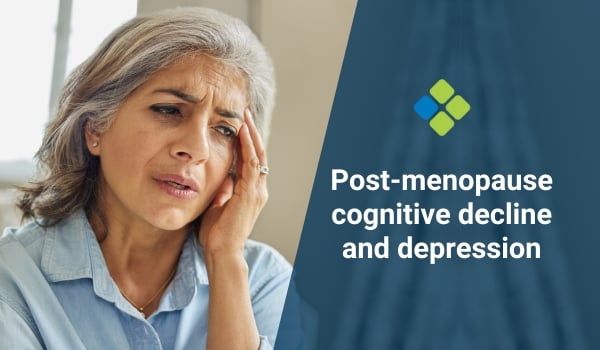Supporting your female patients' mental health
Read more about the unique position of the GP to support the mental health of female patients across their life course.

HealthCert Education
Mental health issues in women are extremely common, with up to 45% of women suffering from a mental health problem at some point in their lifetime. Let's dive into the management of mental health concerns in your female patients in the context of the primary care setting.
Why are women at risk of mental health problems?
Women are disproportionately affected by depression, anxiety and mood disorders, and may be less likely to see medical help due to societal expectations. Hormonal fluctuations related to menstruation, hormonal birth control, pregnancy and menopause also play a unique role in women’s mental health. Women are more likely to be affected by gender-based violence and workplace inequality, which places them at higher risk of mental health conditions. Societal expectations placed on women, such as caregiving, body image and career can contribute to, or exacerbate, mental health problems.
It is important to first identify female patients at higher risk of mental health conditions. Women with adverse psychosocial events (unemployment, divorce, poverty), a history of trauma (including sexual or physical abuse) or substance misuse are at higher risk of mental health conditions. Women with chronic health conditions such as diabetes or autoimmune conditions are also more likely to suffer from depression.
In addition, it is important to note that women with mental health conditions may present with various physical symptomatology, including headaches, fatigue, gastrointestinal conditions and pain. Mental health should be routinely asked about in these higher-risk groups.
Asking about mental health
The general practitioner should ask about mental health in an empathetic, non-judgemental and patient-centred manner. While validated tools such as the Patient Health Questionnaire-9 (PHQ-9) and the Generalized Anxiety Disorder 7 item (GAD-7) can be useful in providing a structured approach to asking about mental health, it is also important to be able to ask open-ended questions tailored to the individual’s circumstances.
Managing mental health issues
Where mental health issues are identified, management is often multi-faceted and should always be patient-centred and proactive.
Lifestyle interventions
Lifestyle interventions such as increasing physical activity, ensuring adequate sleep and encouraging positive social support and self-care can be beneficial for many mental health conditions and can be discussed at an initial appointment.
Psychological therapies
Psychological therapies, such as cognitive behavioural therapy (CBT), and group or interpersonal therapy are effective first-line strategies, however, require onward referral.
Pharmacological therapy
For some women with mental health conditions, particularly those with more severe symptoms, pharmacological therapy may be appropriate, for example, antidepressants or anxiolytic medications. In this case, it is important to consider the risks and benefits of any new medication and therapy should be tailored to individual needs such as the life stage.
Onward referral
In more complex cases, onward referral to secondary care for psychiatric evaluation may be required, such as for suspected mood disorders or psychotic conditions. In these cases, it is important to ensure a collaborative approach with ongoing care involving the general practitioner where possible.
Recognising and understanding the mental health needs of female patients requires a careful and compassionate approach. Integration of a routine enquiry about mental health into usual practice reduces stigma and empowers women to speak about their mental health. Management of mental health conditions often begins in general practice, and the general practitioner is in a unique position to support women’s mental health across their life course.
Dr Samantha Miller, MBChB
Learn more about this topic in the HealthCert online Professional Diploma program in Women's Health
Read more articles like this one on prevalent topics in Women's Health.
Engaging with this blog can help meet your annual
|
|
|
• General Practice Mental Health Standards Collaboration. Mental health training standards 2023–25: A guide for general practitioners. East Melbourne, Vic: Royal Australian College of General Practitioners, 2022.
• Australian Bureau of Statistics. National Study of Mental Health and Wellbeing, 2020–21. Canberra: ABS, 2021. Available at https://www.abs.gov.au/articles/first-insights-nationalstudy-mental-health-and-wellbeing-2020-21
• Mental Health First Aid Australia (2023). Women and Mental Health Across the Lifespan: Understanding Mental Health. https://www.mhfa.com.au/women-and-mental-health-across-the-lifespan/
• Tseris E. (2023). Placing women's mental health in context: The value of a feminist paradigm. Australian journal of general practice, 52(7), 449–453. https://doi.org/10.31128/AJGP-02-23-6715
• Stocker, R., Tran, T., Hammarberg, K., Nguyen, H., Rowe, H., & Fisher, J. (2021). Patient Health Questionnaire 9 (PHQ-9) and General Anxiety Disorder 7 (GAD-7) data contributed by 13,829 respondents to a national survey about COVID-19 restrictions in Australia. Psychiatry research, 298, 113792. https://doi.org/10.1016/j.psychres.2021.113792

 1800 867 1390
1800 867 1390







